- Home
- Anne Easter Smith
A Rose for the Crown: A Novel Page 2
A Rose for the Crown: A Novel Read online
Page 2
“Run and comb your hair and then help me with the supper, daughter. We have guests this evening, so tidy yourself and be you quick about it.”
Kate stared in wonder. “Who is coming?”
Guests were rare at the farm, unless one counted the village field hands or the occasional peddler wandering up the lane that led to the farmyard. Before Martha could reply, shrieks emanated from the house.
“’Tis mine, give it to me!” cried one young voice.
“No, ’tis mine—I found it first,” countered a second.
“’Tis mine, I tell you!” bellowed the first. The sounds of a scuffle were joined by excited barking.
Kate sighed. “Don’t fret, Mother, I will deal with them.”
“Thank you, sweeting. And clean them up for our guests. Richard and his lady wife will be here all too soon.”
Kate ran into the house to pull apart her two younger brothers while pondering her mother’s words. Richard? Who could that be?
After she had chided Johnny and Geoffrey and restored order, she sent them to the well to wash their dirty faces and hands. She watched them reluctantly clump across the room to obey her.
Johnny resembled his father, who was of middling height and stocky, though the boy had his mother’s eyes and light brown hair. He was strong for his age and quiet like his father; it was hard to discern how deeply he felt things because he never cried and did not laugh much. He adored his father and dogged him in the fields and orchard as often as he was allowed, already learning to live off the land at the age of seven.
Kate loved Johnny as a sister should but not nearly to the degree she adored her baby brother, auburn-haired Geoffrey. The bond between the two had been obvious from an early age, when Geoff preferred Kate’s arms to those of his mother. He was quick to cry, quicker to smile and was always in one scrape or another. Kate had no qualms about blaming the five-year-old for the squabble she had interrupted and stopped.
“Mischief makers,” she muttered to herself as she climbed the open staircase to the low-ceilinged loft. She plopped down on the big pallet she shared with her brothers, sending clouds of straw dust into the air and disturbing several fleas. She watched them absentmindedly, killing a few as she tidied herself. Then she stood on tiptoe and stared dispassionately at her reflection in the small piece of highly polished copper her father had tacked up. She grimaced, not realizing the potential beauty in her oval face, tawny eyes and chestnut hair. All she saw were the hundreds of freckles that seemed to have multiplied every time she looked.
There would soon be another babe to care for, Kate thought, as she combed her hair, quickly braided it and brushed the grass off her dress. This one she was looking forward to, now that she was almost grown up and could help care for it. She hoped it would be a girl. A sister would be pleasant after minding two brothers.
A few minutes later, Kate was back in the woods, picking armfuls of bluebells for the pitchers her mother had set out on the table. She knew enough not to pull the flower out by the root, which Martha had told her would cause the plant never to blossom again. As she reentered the house, Fenris, the family dog, bounded around her, almost knocking her down. “Down, Fenris!” she scolded. The animal sat down clumsily to scratch himself in an awkward spot behind his head. The contortion pulled the side of his mouth back into a lopsided grin, and Kate laughed.
“Who be Richard?” she finally remembered to ask her mother, who was busy chopping herbs for a stuffing. “Why should he come here? And what does ‘lady wife’ mean?” She arranged the bluebells as she spoke.
Martha knew she should reprimand the child for her forwardness. As she recognized herself in Kate’s curiosity, she had perhaps allowed her daughter too much freedom. John occasionally chided Martha for her leniency with Kate, but for the most part, both parents saw no harm in her childish need to ask questions.
Martha let Kate’s impertinence pass yet again and answered, “He be kin of mine, and we used to play together as children. But he is rich and now lives at Ightham Mote over by Ivy Hatch. I thought he had forgot me. But—heaven knows why—he sent me word that he and Elinor—‘lady wife’ be the name you give to the wife of a man of Richard’s rank—would sup with us on their way home from some errand at the coast. I have not seen him since I married your father, and I have not met his lady.”
“Is he very grand? Shall I have to curtsy? Will Lady Elinor have many jewels?”
“Kate, you must not ask so many questions! ’Tis time you grew up and became more circumspect,” Martha admonished her, as she pushed the last of the coarse bread stuffing into the cavity of one of the precious capons she had sacrificed for the occasion. But seeing Kate’s downturned mouth, she relented. “No, he be not grand. He be kind and jolly,” she said, spearing the chicken on the turnspit. “Yes, for sure, you must curtsy, just as I taught you to do for Father Godfrey. And no, I do not think Dame Elinor would wear her jewels while riding over these dangerous roads.” She shivered. “I do pray she left them at home.”
A few months back, when Martha had ridden with John into Tunbridge to help on market day, two thieves had set upon them in broad daylight. They had made off only with a bushel of apples and a few coins but had left Martha gray with fear and John pink with anger. Now John never traveled without a stout stick and one of his field hands.
As Martha busily basted the chicken, made a rabbit pie and kept the children occupied with chores, she told Kate of her exploits as a child. She and Richard were about the same age and had grown up only a few miles from each other near Bishopsbourne, on the old Roman road from Canterbury to Dover. Richard’s father, William, had inherited the local manor as well as the Mote at Ightham from his father. Martha’s family was given a cottage on the estate because of their kinship with the Hautes, and she and her brothers were encouraged to play with their higher-born cousins. Richard’s other brothers had not been as tolerant of their young girl cousin, but Richard and Martha climbed trees, chased squirrels, fished in the stream and talked about their futures. Richard dreamed of knighthood and fighting in wars in foreign lands. Martha dreamed of her own knight, a manor like Bishopsbourne and a nursery filled with children. Richard, she always knew, was destined for a grand future—perhaps at the king’s court.
Martha had married John, a friend of her father’s from his service with the king in France. Her father had breathed a sigh of relief to see her settled at the ripe age of nineteen. He had despaired of any man taking his headstrong daughter off his hands. John’s farm, here on the western borders of the county, was his by the ancient Kentish right of gavelkind, a system through which a son could automatically inherit land from his father. Her connection to the Haute family had provided a small dowry, and John had used it to improve the farm.
Privately, Martha had thought John, at forty, was old, his plain looks and stocky build a far cry from her dream of the young knight. John had been good to her, but she often thought how different life might have been had her white knight swept her off her feet. As usual after one of these fantasies, she sighed.
“Mother, are you listening to me?” Kate’s voice interrupted her. “I have asked you three times where I should put these bluebells! ’Twas not a moment ago you chided me for daydreaming,” she teased. “What were you thinking about, dear Mother? Do tell.”
Martha grinned sheepishly. “There you go again, asking questions! Perhaps if I had been as pretty as you, Kate, I might have been carried off by a handsome young knight,” she said. “That was the dream I had when Cousin Richard and I used to share our secrets many years ago. But if I had not wed your father, then I would not know the delight of having you as a daughter, would I?”
Uncharacteristically, Kate blushed.
“Now, stop chattering and put that pitcher down there on the table.”
THE KITCHEN WAS FILLED with mouth-watering smells from the roasted chicken and pies and bread, bringing the boys racing in to ask for handouts. Martha smacked Johnny’s hand when he dug
a finger into the bowl of cream on the table. He let out a howl of protest and retreated to the doorway to wait for the guests. Kate was combing Geoffrey’s unruly curls when Fenris raised his head, cocked it to one side and gave a warning growl.
“They be here, they be here!” cried Geoffrey, jigging up and down on the doorstep. “Look, Johnny, they be coming.” He grabbed his brother excitedly.
Johnny called back to his parents, “Mam, Father, they be here!”
“I would never have guessed,” quipped Martha, winking at Kate and jumping as Fenris let loose with a fanfare of barking.
John came down from the bedchamber and strode to the front door. Kate gaped at her father in his dark green tunic trimmed at the hem with rabbit fur. The hood in a lighter shade of green that was draped over his shoulders had been pushed back from his head to show his neatly combed but thinning hair. She thought how handsome he looked. Martha wiped her hands on a cloth, moved the pipkin of vegetables to a cooler spot in the embers and joined him at the door. Her hand characteristically straightened her cap and pushed a stray strand of hair under the coarse linen. Kate ran to the window to watch the arrival.
“How now, boys, and how do they look?” John asked his sons, taking the younger by the hand and walking towards the small group on horseback making its way up the path.
“Grand,” said Johnny, staring at the rich cloak and tall hat of the leading rider.
“Greetings, John, I trust you are expecting us,” Richard Haute called.
“Expecting you?” John replied, taking Elinor’s bridle and helping her down. “Martha has prepared a banquet for an army!”
The Hautes, their maidservant and Richard’s groom dismounted and made their way into the kitchen. The Bywood family ushered them in as if they were royalty.
“Welcome, my dear Richard.” Martha beamed at her childhood playmate, who took her hand and then bent to give her a smacking kiss on her lips. “How glad I am to meet you, Dame Elinor,” she said, turning to the petite woman by Richard’s side.
Elinor’s sweeping gaze took in Martha’s plain dress, reddened hands, and white-capped head. “Delighted, to be sure,” she replied, pushing past Martha and surveying the scene with contempt. Martha fluttered behind her, dismayed by the haughtiness and unfriendly greeting.
“Why, I pictured you much younger, my dear,” was all Elinor said before turning her black, birdlike eyes on the three children standing awestruck at the end of the table.
“Pretty child.” She acknowledged Kate but ignored the boys completely. “She’s bound to be trouble when she is older, I warrant. Sweet heaven, is this where we are going to dine—in the kitchen?” she asked nobody in particular, eyeing with disdain the trenchers, crude horn cups and Martha’s pride and joy, a pewter saltcellar.
Kate’s dander was up. Though she was too young to understand the slight Elinor Haute had given her mother, she certainly did not like the way the woman looked as though there was a bad smell under her nose. What was wrong with eating in the kitchen? She knew nothing else and was proud of the stout, immaculately scrubbed table now covered by a spotless linen cloth, the earthenware pots that hung from a beam, the cheery fireplace and fresh rushes on the floor. Martha’s dried herbs were hanging in neat rows from another beam, and John’s pike stood in a corner, a reminder of his service to the king. The bluebells she had arranged in pots gave splashes of color to the table, mantel and chest. And she knew her mother’s food was the best in the world.
“Where do you eat?” she asked Elinor, drawing a frown of warning from her mother and a “Hush, Kate” from her father. The woman was surprised but not offended by the girl’s question.
“Why, child, we have a banqueting hall at Ightham,” she purred with satisfaction. She turned to Martha. “Do you always allow your child to speak before being spoken to, goodwife?”
Martha bit her lip and neatly averted any more questions from her outspoken daughter by ignoring Elinor and inviting the group to sit down. John poured the wine he had been saving for a special occasion, and the three children took their plates and sat on a bench in a corner of the room with the trenchers in their laps.
Kate whispered to her brothers, “What a horrible woman. I wonder why Cousin Richard ever married her.”
Johnny and Geoff were much too intent on tackling the feast in front of them to bother responding. Kate could not help watching the adults surreptitiously. She noticed Master Haute appeared quite at home in his cousin’s kitchen, spearing slices of rabbit pie with his knife and smacking his lips at every bite.
“What can you tell us of the king and his court, Richard?” her father was saying. “We hear so little of politics here in Snoll’s Hatch.”
Richard Haute hesitated. He had hoped serious conversation could be avoided in the congenial atmosphere in which he now found himself. But he respected his cousin’s down-to-earth husband and knew him for a good man, albeit misguided in his loyalty to King Henry and his queen, Margaret of Anjou. Haute was secretly loyal to the duke of York, the head of the royal house that was rival to the king’s house, Lancaster. He was a renegade in his Lancastrian family. He had been at court during the duke of York’s protectorate and had been impressed by that lord’s governance. Looking now at John’s innocent expression, Richard Haute weighed his words carefully.
“The king, they say, has fits of madness,” he began. “His grandfather, Charles of France, was a madman, that is well known. It is unlikely this sixth Henry will ever rule us in the manner of his noble father. The queen, on the other hand, has far too much cleverness to mean the country good. I warrant she fears the overthrow not only of her husband but also of her son, and she is therefore showing the claws of a protective lioness. You’d not lay blame upon the lady, in truth, but I fear her strength of purpose will mean more conflict.”
“But if she be so clever, Richard, why do you not think she would make a goodly regent and guard the throne for her husband and son?” John asked, still innocently. Disloyalty to an anointed king was not only treasonable but also a sin in the eyes of the church. In some quarters, Henry’s madness was equated with saintliness; it was believed that God touched those deemed simple-minded. To those God-fearing people, Henry was therefore doubly untouchable.
Richard took another mouthful of chicken and was trying to think of something diplomatic to say about the witch of Anjou when Martha inadvertently knocked over a cup of ale. A stream of the amber liquid slid across the table and sent a waterfall straight into Elinor’s lap. Everyone jumped up, dabbing at the spill with napkins and kerchiefs, while Martha ran around the table to help Elinor, who was on her feet, holding up the offending stain for all to see.
“You stupid woman! I fear my gown is ruined,” Elinor snapped, ignoring Martha’s ministrations.
Martha’s patience was at an end. “’Twas an accident, madam, as you well know, and you have no right to call me stupid!” she retorted.
Kate stared at her mother with new admiration. She had been the recipient of Martha’s sharp admonishments many times, but her mother had never raised her voice to John or any other adult before. Even the boys paused in their eating to turn around, and Kate saw her father smirk before lifting his napkin to his lips to cover his amusement.
“How dare you speak to me that way,” Elinor hissed. “Richard, tell her!” She glared at him, waiting for Martha to be taken to task. Kate held her breath.
“Enough, Elinor!” Richard barked, making Martha jump. “As Martha said, ’twas but an accident. Stand by the fire a piece, and your gown will dry soon enough.”
Elinor’s mouth dropped open, but then she closed it and acquiesced sulkily.
He thought it wise to change the subject. “Fine-looking boys, John. And from the looks of Martha, you’re expecting another.”
Martha shot Richard a grateful look, and he winked at her.
“Yes, we be fortunate to have three healthy young ’uns, and, God willing, the fourth will be as healthy,” John replied.
Richard beckoned to Kate, who was trying her best to remain unnoticed. “Come here, sweeting,” he called. She rose and went to his side. He put his arm around her waist, pulling her to him.
“What is your name, child?”
“Kate . . . Katherine,” she replied. His breath smelled of ale, like her father’s, but she could also detect a sweet perfume on his clothes. She raised her brown eyes shyly to his twinkling blue ones and asked what the smell was. Richard was amused.
“Why, it is perfume from across the sea—from Arabia,” he said, turning to his groom, who, at Martha’s insistence was sitting on a stool by the fire rather than alone in the stable. “Ralph, go fetch me the bottle from my bag. I will sprinkle a little on you, my fair Kate. Mother of God, I fear you will break many hearts when you are grown. John, you had best lock this one up!”
Kate was enjoying the attention. Mary, Elinor’s maid, smiled at her from the end of the table, and her father winked at her. Having witnessed Martha’s recent triumph, she was emboldened to say, “If my father locks me up, sir, how will I get me a husband? And as I am going to be a great lady, I will need a grand husband.”
Richard roared; her father frowned; her mother sighed.
“You will not get a husband with a speech like that, my girl,” said her exasperated father, waving a half-eaten chicken leg at her.
“Leave her be, John. I like her spirit. It reminds me of her mother,” Richard said mischievously. “You are quite right, sweetheart. Locking you up would deprive some poor devil of the pleasure of your company. I could wish my own Anne had more of your courage. She is a dear girl and the apple of my eye, but she is a mouse, in truth.”
Elinor swung round to face him, her brows snapping together, her thin lips pinching in parallel.
“Anne is an obedient and dutiful daughter, Richard. And I have worked hard to make her so for your sake. Now you complain of her quietness. Am I to be again chastised about the rearing of our child?”

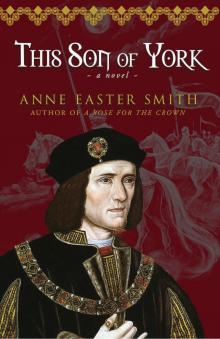 This Son of York
This Son of York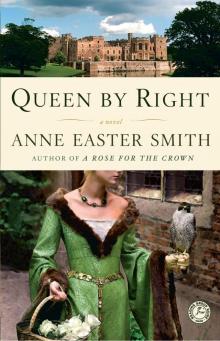 Queen By Right
Queen By Right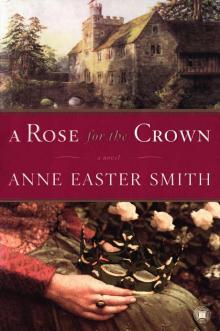 A Rose for the Crown: A Novel
A Rose for the Crown: A Novel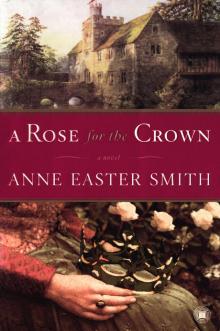 A Rose for the Crown
A Rose for the Crown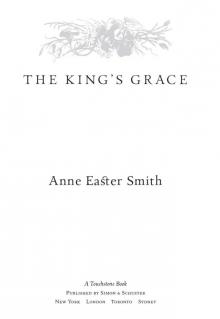 The King's Grace
The King's Grace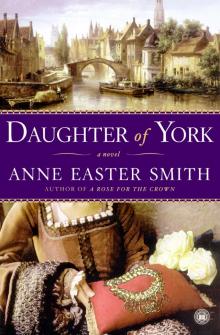 Daughter of York
Daughter of York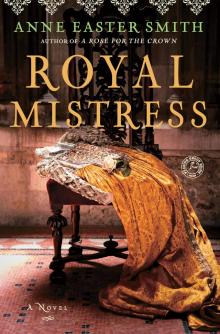 Royal Mistress
Royal Mistress